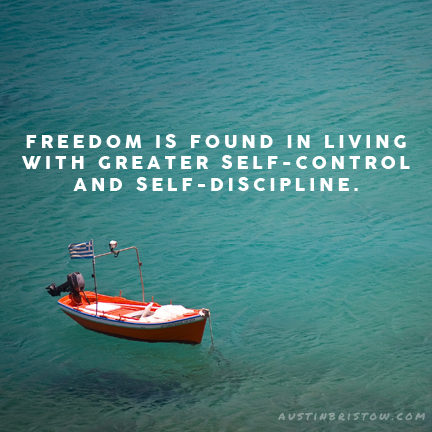One of the difficult things to navigate in life is keeping balance when we’ve entered a new season. Understanding when to step on the gas and when to shift our focus is critical to making sure we don’t lose sight of what’s really important.
Category: Personal Develoment
Garbage In Garbage Out
The music, writings, shows and conversations we surround ourselves with can have a profound impact on how we act every day. Being able to recognize a “cultural toxin” can do wonders to keep us headed in the right direction!
Setting The Perfect Trap
It’s easy to get caught up hoping things will line up perfectly before we begin, but it’s in that thinking that the Perfect Trap sneaks up on us and ultimately keeps us in a holding pattern.
Flexing The Right Muscles
In goal setting, there are lots of possible routes to take. But when we flex the right muscles we make the most efficient progress possible.
I’m most excited about this video because it means I’m flexing the right muscles as it relates to verbalizing my dream!
How to Know You’re On To Something
When we start new habits with the goal of becoming more disciplined, people will typically respond in a few ways:
“Wow, you’re crazy! I could never do that…”
“I don’t know how you do that every day…”
“I don’t have enough self control to do that…”
What we do when we’re disciplined will seem counter cultural and people will think it a rare talent or gift. The truth is, we were the same way until we started this new routine…
Only paying for things with cash to stay on budget. Waking up at 5:00am to exercise. Not having dessert at dinner parties. Paying off a mortgage early.
Doing anything with dedicated consistency will cause people to notice. That’s how you know you’re on to something.

Verbalize Your Dreams
Sharing our dreams with people has the potential to create massive amounts of self-doubt.
There’s a fear of rejection, a fear of ridicule, a fear of having to actually start now that we know people will check in on our progress. It’s intimidating.
But our dreams are supposed to lift us up and give us something to hope for. Which makes it all the more sad that we tend to suppress our dreams for fear that they “may never come to fruition” or have a chance of “actually” happening. This is a crazy irony that won’t help us accomplish any dream — ever.
Yes – when you verbalize your dreams you’ll inevitably run into people that try to cast a negative light. But you’re also going to run into people that say, “Hey, I know this guy that can help you with that exact thing. Let me connect you two.” And that’s where the magic sauce starts to come together.
So what it is you want to start?
What do you want to accomplish?
Who do you want to impact?
You don’t have to have it all mapped out (it’s not going to go as planned, anyway), you just have to admit that that’s what you want to do.
Personally, my entrepreneurial dream is to be a public speaker. I want to share a message with people that living with greater self-discipline in our lives actually creates more freedom. The reason I started blogging was to help foster and streamline those thoughts and ideas. Now I have to turn it into a cohesive spoken message that I can share and then convince someone to let me speak to their group(!).
It’s intimidating. I’m not totally sure of what I’m doing. But it’s my dream and my passion, and the satisfaction of pursuing my dream outweighs the regret of sitting in complacency.
So really – what is it you want start, or change or accomplish? Verbalize it! I’d love to hear in the comments below.

Why Discipline Matters
We’re in debt.
We’re overweight.
We’re discontent.
Our relationships don’t last.
Yet the world continues to preach “do what you want when you want”; that the ultimate freedom is in living with a nearly reckless abandon.
But what if that’s not working for us? What if we decided to try the opposite?
We would have to think about why discipline matters and believe that freedom is actually found in living with greater self-control and self-discipline.
On the surface, this seems completely counter-intuitive: constrict or constrain what it is I do on a daily basis in order to do more?
Yes.
If we lived on a budget, we wouldn’t be in debt.
If we exercised and ate well, we’d be in better health.
If we stopped comparing what we have to what “everyone” on social media has, we’d realize we’re probably in pretty good shape.
If we kept our eyes focused on our marriages and families and made dedicated efforts to invest in those people, we would be more fulfilled than ever before.
These are the opportunities that discipline provides for us. This can be our world when we take time to sit down, set goals, have honest internal dialogue about what’s important to us and start taking responsibility for our actions.
2 Tim 1:7 tells us that “God gave us a spirit not of fear, but of power and love and self-control.” We were made to live with self-control. We can do this!
Is it easy? Absolutely not. Donuts are delicious (yet unhealthy). Last-minute outings with our friends are too good to pass up (and weren’t in the budget). But if our waist lines and our wallets become stretched by our normal decision making, we really ought to say “no”. But it takes discipline.
The truth is, deep down, we all know this stuff. The hard part is recognizing it, admitting it and doing something about it.
Discipline matters and makes all the difference.

On Starting Your Own Business
One of the coolest things about our continual surge in technological advancements is the effect it has on starting your own business.
Two and half years ago, my wife knew she could make money as a hand letterer. With the purchase of a $300 computer and a 20 cent listing fee on Etsy, she had an e-commerce store all set up (enter Staples button saying “that was easy”).
Our grandparents couldn’t quite grasp how that was possible. Our parents were supportive, but definitely showed a little apprehension as to how it would all play out. Our friends thought it was awesome and were almost instantly jealous.
No, it didn’t turn into a full-time job overnight, but the fact of the matter is she was able to start it literally overnight.
That’s never been possible until now – and it’s awesome.
The key is to strip down the grandiose idea to its bare essentials and find out what it’ll take to start. Odds are good, you won’t have to lay too much cash out upfront. Handicapping yourself with debt to get the ball rolling is not an ideal situation.
So start simple. Make a few bucks. Do the same thing again. Make a few more bucks. Then begin to implement steps to build something bigger.

Accepting Thanks
One characteristic that’s so often admired in society is humility – deflecting attention from ourselves and dispersing it to others. But what if, in that same act of humility, we’re also denying someone the opportunity to do something kind for us?
Deflecting Everything
Think about it; giving unexpected gifts or praise to someone isn’t a requirement in society (in fact, it can seem quite rare these days). So when someone approaches me and says “great job” or “thank you so much for your help” or they pick up my tab before I can pay, they’ve gone out of their way to lift me up.
If I respond to that person with “Oh, I thought I did terrible” or “No, don’t mention it” or refuse to let them pay, I’m in essence blowing off their compliment or gift and denying them the opportunity to do something kind for me.
It’s A Basic Need
One of Maslow’s five basic needs* is esteem. As humans, one way to increase self-esteem is to give and build others up. It feels good to do good for others. So when I deny someone the chance to share a gift or compliment with me, I’m basically denying them the chance to build their own esteem.
Instead, I have to work on a very simple response: looking them in the eye and saying, “Thank you, I really appreciate that.” Nothing more; nothing less. In this way, I’m fully accepting their compliment or gift and acknowledging the fact that they’ve done something nice for me. We both ultimately take something positive away from the experience.
(It’s also important to note that this doesn’t displace our ability to stay humble. Thanking someone and being appreciative doesn’t come across as showy or self-serving — you’re simply grateful.)
What do you think? Do you struggle with accepting gifts? When was a time you were able to give a gift and it made you feel awesome?
*I still contend he missed the one specifically about bacon, but will settle that at a later time.

It Can Wait (I’m So Excited!)
Excitement is an exciting thing, isn’t it?
It bubbles up and overflows and gets us all jittery to the point that we just want to yell “I CANNOT WAIT FOR….” (fill in the blank).
During my wife and I’s pre-marriage classes, however, our priest made an interesting point that changed my perspective on this phrase.
Understandably, after most people are engaged, they’re pretty jacked about it and cannot wait for their wedding day. That’s how I was. And that’s how my wife was. But our priest wanted us to consider it from a different angle.
Instead, he challenged us to say that we were “so excited” for our wedding day.
He told us when we “cannot wait” for something to happen, we’re verbally wishing the time away between now and then. We essentially want it to never happen and just skip straight to that one event that’s lingering out in the future.
But when we do that, we miss all of the things we’re supposed to experience between now and then. We end up living our lives jumping from one big thing to the next, constantly rushing passed everything in the middle. Like only eating the cookies on a Nestle Toll House cookie sandwich and skipping the ice cream (who does that?!)
While it wasn’t a monumental shift in verbiage, it ended up changing the tone and expectation of what we were working toward. In the context of our engagement, we still had some learning to do and important conversations to work through to be on the same page about how our marriage would work. If we had gone straight from my bended-knee proposal to the alter, it might have been a much different transition into married life.
The same thing applies to other areas of our life. Maybe you’re taking a new role at work, and you cannot wait to start in the new position. But if the re-org doesn’t happen for three more weeks and you mentally check out of your current job, some important task or life lesson may well pass you by. And then you’ve missed out.
Being excited for things isn’t a bad thing. In fact, it’s exciting! But expressing that excitement in the right way and keeping it in perspective can make the experience even more fulfilling when we (finally) get there.